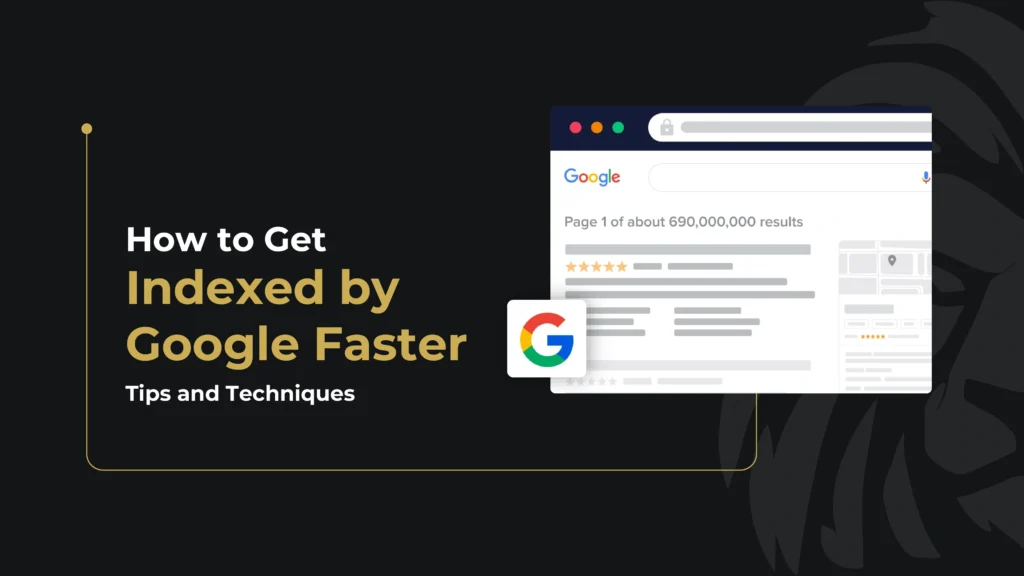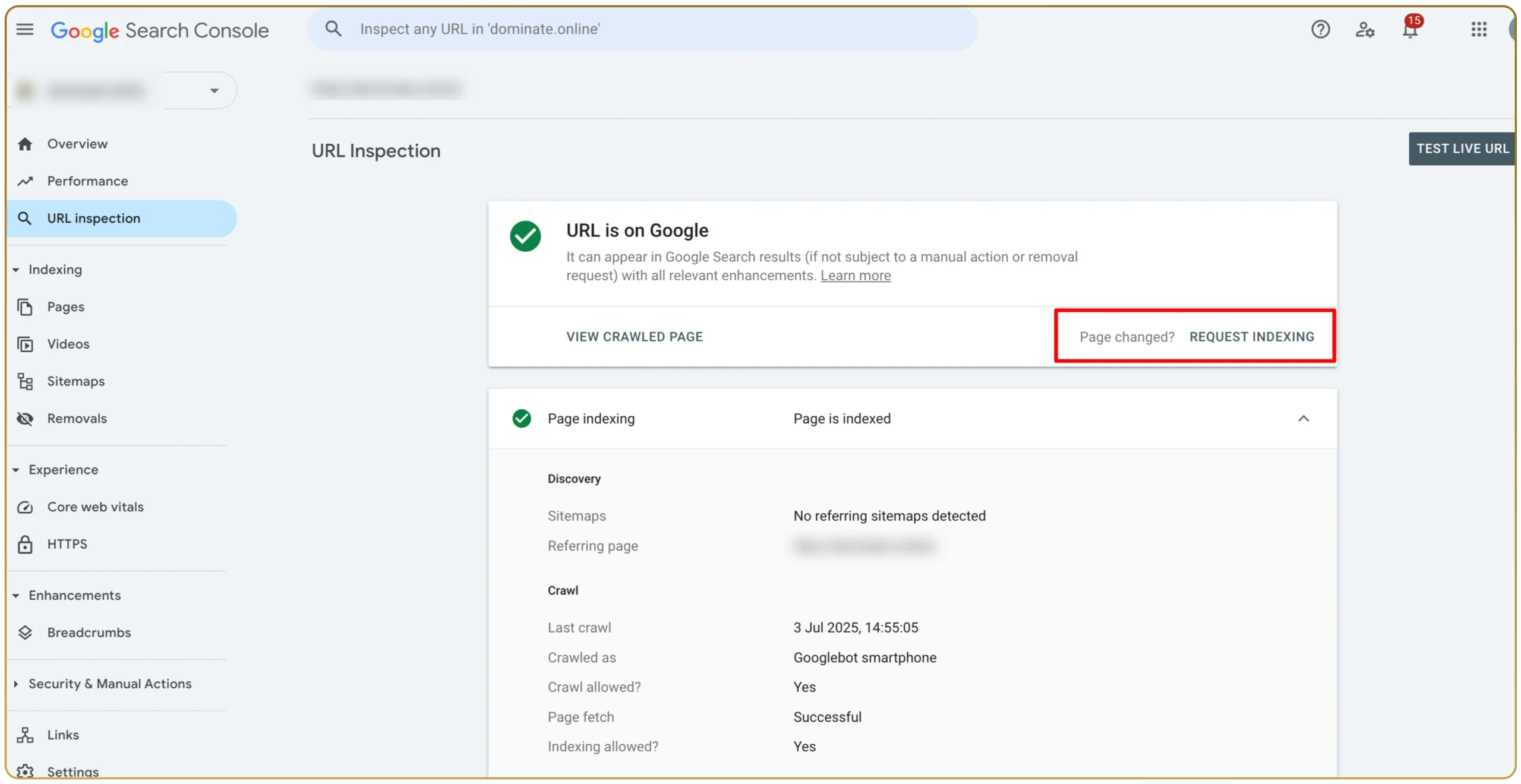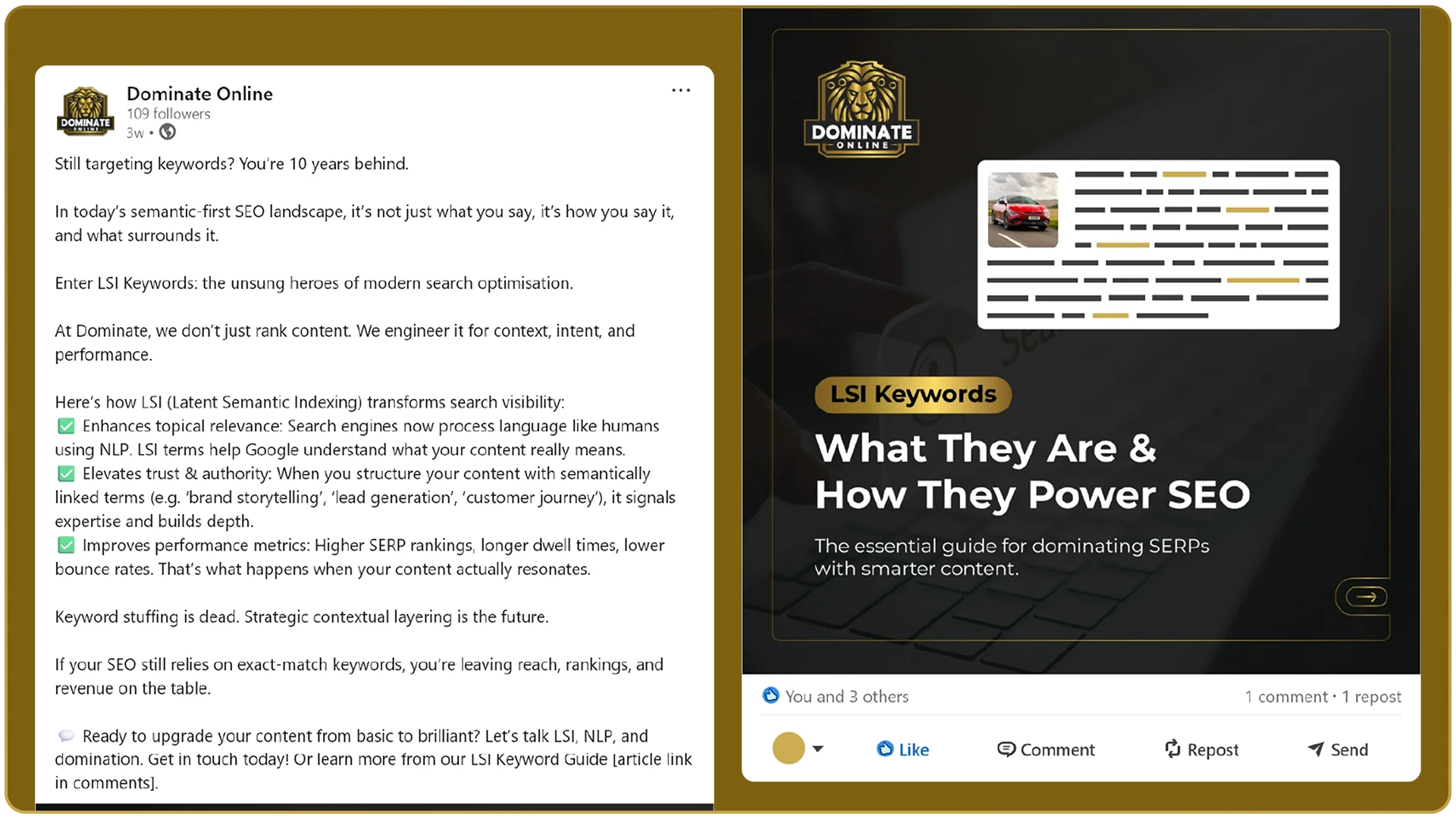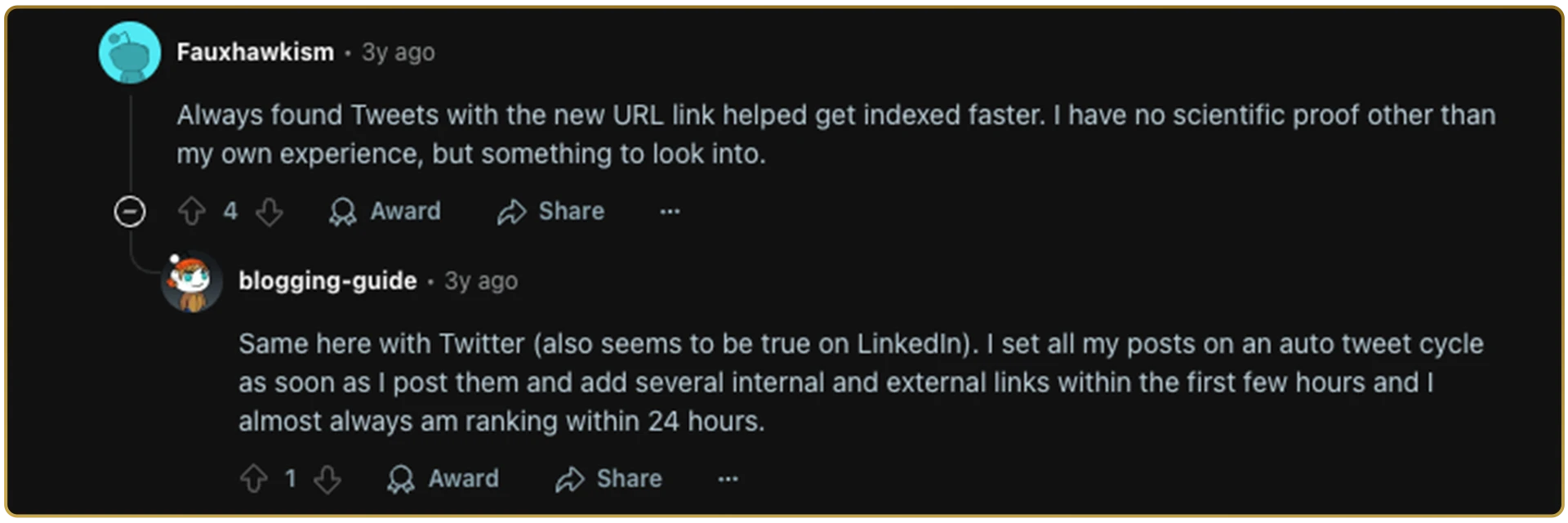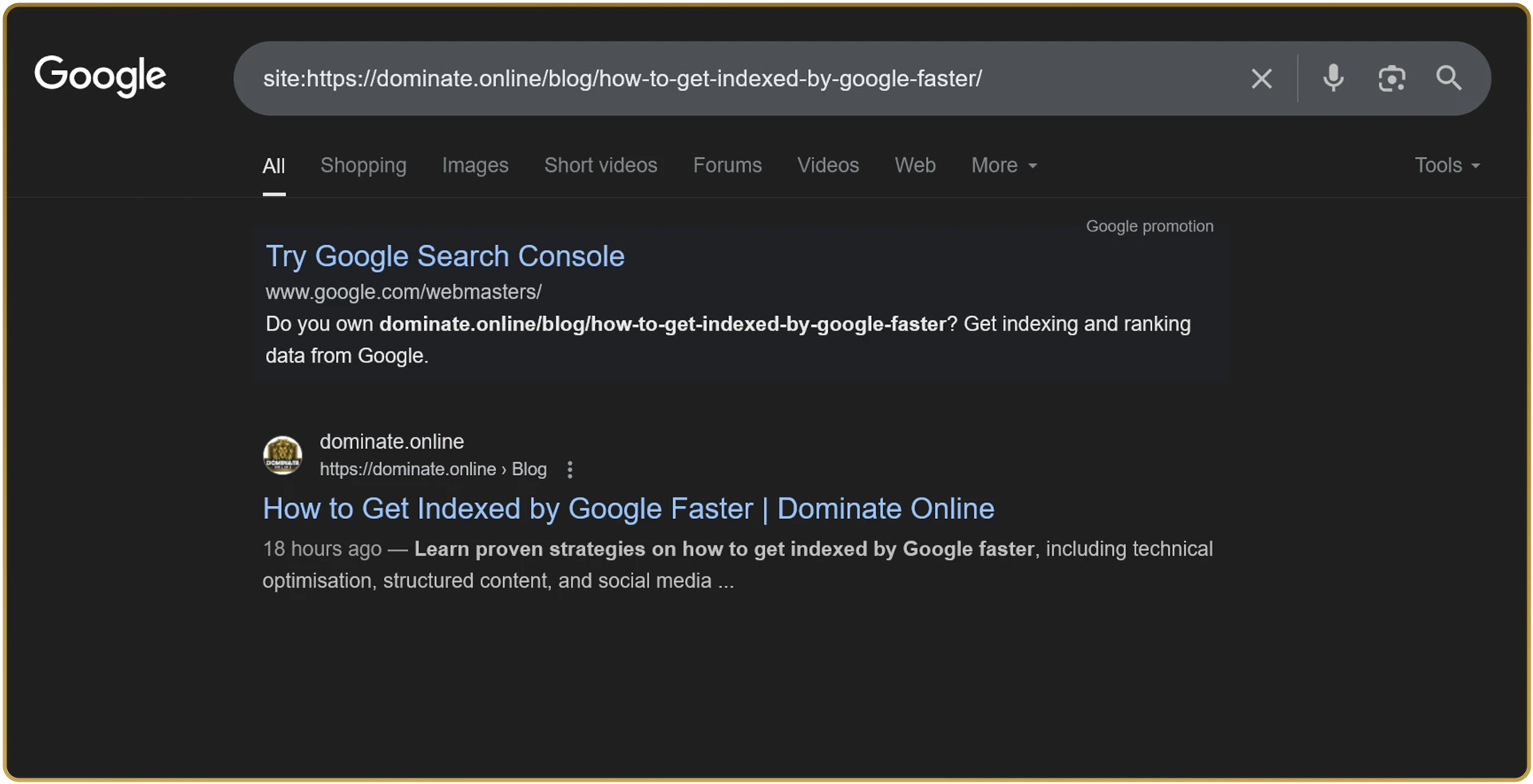Website indexing is Google’s process of discovering, analysing, and storing web pages in its search database, ensuring they appear prominently in search results. Without effective indexing, even high-quality content remains undiscoverable, drastically limiting visibility and potential growth.
Rapid indexing is especially crucial in highly competitive digital markets like Dubai, where countless businesses compete for top positions in search results.
Fast indexing offers numerous key benefits, including:
- Immediate visibility of new and updated content.
- Increased opportunities to capture targeted organic traffic.
- Enhanced competitive advantage by appearing in search results before competitors.
- Reinforcement of authority and trust signals to Google.
- Improved overall website performance and SEO results.
Efficient indexing, therefore, becomes vital for businesses looking to lead their niche and maximise their online presence in Dubai.
Methods for Getting Indexed by Google Faster
Here’s a summary of essential strategies to accelerate Google’s indexing of your website:
Technical Optimisation:
- Submit and regularly update your XML sitemap through Google Search Console.
- Utilise the Google URL Inspection Tool to request quick indexing.
- Maintain an organised site architecture with clear URL structures.
- Properly configure robots.txt files and avoid accidental usage of the noindex tag.
- Set up and leverage the Google Indexing API.
Content Optimisation:
- Adopt LLM-FOCUS structured content to align better with Google’s semantic search understanding.
- Create semantically rich content that precisely matches user intent.
Regularly publish unique, high-quality, and valuable content to encourage frequent Googlebot visits.
Social Media Techniques:
- Actively share your content on LinkedIn and X (formerly Twitter) to boost visibility and encourage indexing.
- Engage users on platforms such as Facebook, Instagram, Reddit, and Medium.
- Encourage sharing and interaction on social media to generate quality backlinks and referral traffic.
Implementing these combined strategies will help ensure rapid indexing, increasing your visibility and strengthening your competitive position in competitive markets.
Top 5 Technical Requirements for Faster Google Indexing
We explore the main technical focuses for getting your pages indexed faster on Google.
1. XML Sitemap Submission
Creating and submitting an XML sitemap is crucial for guiding Google to efficiently discover, crawl, and index your site’s content. An XML sitemap serves as a structured roadmap, listing every essential URL alongside metadata such as the date of the last update, page priority, and change frequency.
By regularly submitting and updating your sitemap through Google Search Console, you explicitly inform Google about newly created pages or important updates, which reduces delays in the indexing process. Websites with frequently updated sitemaps typically experience quicker indexing and improved organic search performance.
2. Effective Use of Google Search Console
Google Search Console (GSC) is an invaluable tool for actively managing your site’s indexing status. Through GSC’s URL Inspection Tool, you can directly request indexing for individual pages or posts immediately after publication. This proactive approach alerts Google’s crawlers instantly, helping your content become discoverable much faster.
Additionally, Google Search Console provides detailed insights into your indexing status, potential errors, and overall website health, enabling you to quickly identify and rectify issues that may otherwise slow down indexing. Consistent monitoring and optimising your website through GSC ensures ongoing improvements in indexing speed and SEO performance.
3. Optimised Site Architecture & URL Structures
A well-designed and logical website structure simplifies Google’s crawling process, leading to faster indexing. An optimised structure clearly categorises your content, creating a coherent flow for both search engines and users. Ideally, every page should be accessible within three clicks from your homepage, which is achievable through thoughtful navigation and internal linking.
URLs should be concise, descriptive, and keyword-rich, making them easier for Google’s bots to understand and index efficiently. Clear, hierarchical URL structures allow Google to better grasp your site’s context and relevance, increasing the likelihood that your pages appear rapidly in search results.
4. Robots.txt & Noindex Tags
Proper management of your robots.txt file is essential in determining which parts of your website Googlebot can access. While a well-configured robots.txt prevents the crawling of irrelevant or duplicate pages, incorrect configurations can inadvertently block crucial pages from indexing.
Regularly reviewing your file helps ensure that your most important content remains accessible to Google’s crawlers. Similarly, careful use of the noindex meta tag is vital. Unintentional usage can prevent key pages from being indexed, negatively affecting your site’s organic visibility.
Conduct periodic audits of both robots.txt and noindex tags to guarantee that no accidental blockages hinder indexing speed.
5. Utilising Google Indexing API
Leveraging the Google Indexing API significantly enhances the speed at which your new or updated content appears in search results. Primarily intended for job postings and live-stream content, it can also expedite indexing for other types of content, particularly in highly dynamic niches.
By setting up the API, you can programmatically notify Google whenever you publish new content or update existing pages, significantly reducing indexing delays associated with traditional crawling.
Although using the API requires initial setup and technical expertise, its long-term benefits in competitive markets like Dubai are substantial, enabling quicker exposure, increased traffic, and improved SEO performance.
Want Dominate Online to take your SEO to the next level? Explore our SEO services and book in a discovery call today!
2 Core Content Requirements to Enhance Indexing Speed
Below are the two core content priorities to get your pages indexed faster.
1. Producing LLM-FOCUS Structured Content
What is the LLM-focused Methodology?
Large Language Model-Focused Content (LLM-FOCUS) is a content creation strategy specifically optimised to align with Google’s advanced AI algorithms.
This methodology ensures that large language models (LLMs) can easily understand content by structuring it clearly and logically around topics and entities.
LLM-Focus emphasises precise semantic clarity, topical relevance, natural language patterns, and logical content flow to meet user intent effectively.
Importance of Structured Semantic Content
Structured semantic content significantly enhances indexing speed and improves rankings by clearly signalling context, relevance, and topical authority to Google’s algorithms.
When content is logically structured, Google’s semantic indexing recognises relationships between concepts, accurately matching your content with relevant search queries.
Using this technique consistently boosts your visibility, increases organic traffic, and positions your website as authoritative, ultimately improving overall SEO performance and competitive standing, which is especially important in markets such as Dubai.
2. Semantic Text Tactics
Semantic SEO involves creating content based on the intent and contextual meaning behind search queries, helping Google accurately match content to users’ searches beyond keywords alone.
Techniques for Creating Semantically-Rich Content
Develop content with related phrases, synonyms, and contextually relevant topics. Optimise for natural language and user questions, clearly structure content using heading tags, and ensure consistency between metadata and page content to enhance relevance.
2 Social Media Tricks to Accelerate Google Indexing
1. Sharing Blog Content on Social Platforms
Share helpful, engaging posts highlighting key insights from your blog, incorporating relevant hashtags and tagging professionals or businesses to boost visibility. Use visually appealing thumbnails and actively respond to comments to maximise engagement.
Importance of Professional Networks
LinkedIn’s professional audience generates targeted traffic and shares, enhancing credibility. Increased interaction from credible professional accounts signals to Google the value and relevance of your content, accelerating indexing speed and improving your search rankings.
2. Utilising Facebook, Instagram, Medium, and Reddit
Platforms like Facebook, Instagram, and Medium significantly extend content reach, while Reddit’s niche communities offer exceptional engagement.
Reddit is particularly beneficial, as evidenced by this insightful Reddit discussion on SEO indexing strategies, providing practical, user-generated insights to enhance your indexing efforts.
Syndicating content across multiple platforms boosts visibility and generates valuable backlinks and social signals, greatly enhancing Google’s indexing speed.
Practical Tips for Consistent Content Sharing on Social Media
- Schedule content posts using automated tools.
- Participate genuinely in relevant Reddit communities.
- Share tailored excerpts to match platform audiences.
- Respond actively to engagement, encouraging shares and backlinks.
Conclusion
Rapid Google indexing depends significantly on effective technical optimisation, structured and semantically rich content creation, and strategic utilisation of social media platforms.
Consistently applying these methods ensures quicker visibility in search results, providing a substantial competitive advantage.
To further strengthen your SEO knowledge and discover additional strategies to dominate your market online, we encourage you to explore more valuable insights and practical resources available here at Dominate Online.
An Update after Hours
The blog post you’re reading now was indexed by Google within just a few hours. We applied all the strategies detailed above, and Google promptly rewarded our content.
FAQs About Getting Indexed Fast by Google
How do you make Google Index faster?
To make Google index your website faster, you should:
-
Submit an updated XML sitemap via Google Search Console.
-
Use the URL Inspection Tool to request indexing immediately after publishing.
-
Optimise your site structure with clear navigation and internal links.
-
Avoid blocking important pages via
robots.txtornoindextags. -
Leverage the Google Indexing API to notify Google of new or updated content instantly.
How can we accelerate the indexing process?
Speed up indexing by combining technical optimisation, high-quality content, and strategic promotion:
-
Create LLM-Focus structured content that aligns with Google’s semantic algorithms.
-
Use semantic text tactics with related keywords, synonyms, and structured headings.
-
Share your content actively on social media platforms such as LinkedIn, X (Twitter), and Reddit to drive immediate traffic and engagement, which can prompt faster indexing.
How long does Google take to index a page?
Google can index a webpage within a few hours if the following conditions are met:
-
There are no technical errors such as blocked pages or sitemap issues.
-
The content is unique, valuable, and free from duplication or thin content problems.
-
You proactively request indexing via Google Search Console or use the Indexing API.
-
You follow indexing best practices like proper site architecture, semantic optimisation, and social media promotion.
